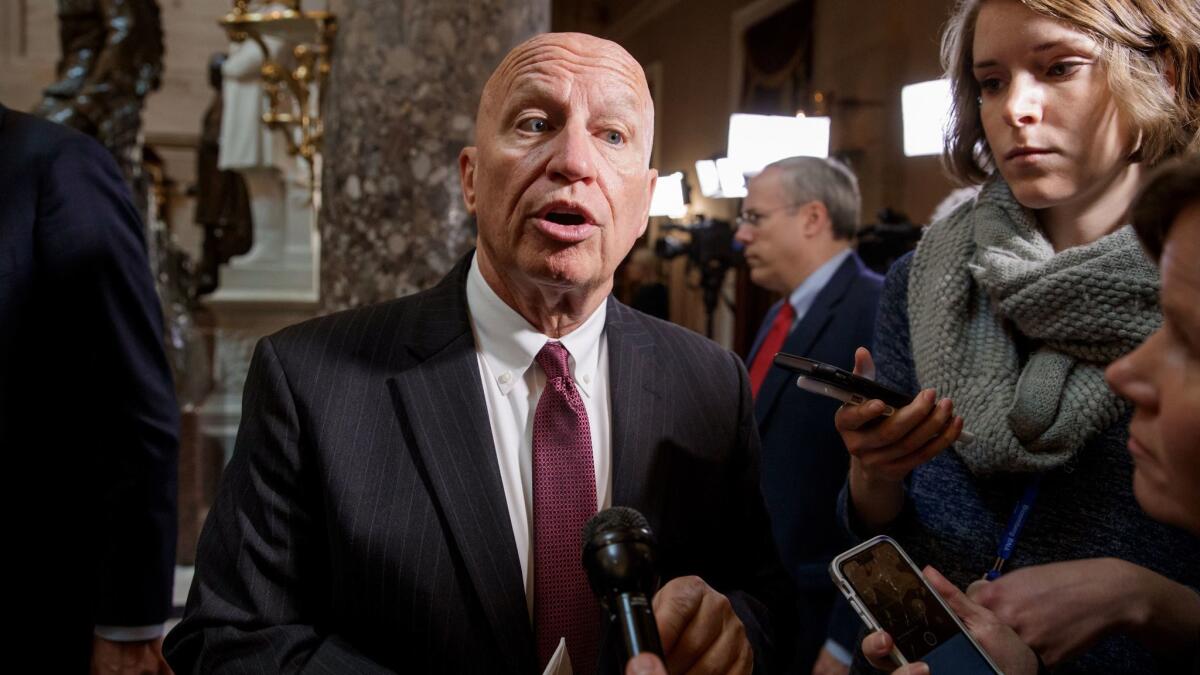GOP deal to keep property deduction as part of tax overhaul leaves California lagging some other states

The decision by a key House Republican to maintain the deduction for property taxes but not for other state and local taxes is a victory for California but a bigger win for residents of other states.
While California has the highest top state income tax rate in the nation, the state ranks in the bottom third by one measure for property taxes, which have been limited since voters passed Proposition 13 in 1978.
“Retaining the property tax deduction is throwing us a bone but it is not enough,” said California State Controller Betty Yee, a Democrat. “The federal tax reform plan remains unfair to Californians.”
However, the deal to keep part of the state and local tax deduction in the Republican tax overhaul bill set to be unveiled Wednesday still would be a win for California. Republicans had planned to eliminate the deduction.
It’s just not as big a victory as it is for New York, New Jersey and several other states where property taxes make up a larger share of the overall tax burden, said Jared Walczak, a senior policy analyst at the nonpartisan Tax Foundation.
“California receives a substantially high benefit from the property tax deduction,” he said. “It’s just that California receives such a disproportionate benefit of the overall state and local tax deduction that this looks more modest by comparison.”
In 2014, Californians claimed $70 billion in federal deductions for state and local income taxes but only $27 billion in real estate, personal property and other taxes, according to the California Franchise Tax Board.
But the property tax portion of the state and local deduction is more of a benefit to middle-class Americans overall than the broader state and local deduction, Walczak said. That’s because the value of property doesn’t increase as much as income for people who are wealthy.
“Someone who earns 10 times the median income is unlikely to have a house that is 10 times the median home value,” Walczak said.
U.S. households earning $500,000 or more annually claimed 7.1% of the overall value of the state and local deduction as a percentage of adjusted gross income. That percentage was only 1.1% for the property tax deduction, the Tax Foundation said.
House Majority Leader Kevin McCarthy (R-Bakersfield) downplayed the effects on Californians of changes to the state and local tax deduction. Instead, he stressed the bill’s broader revisions in the tax code bill, including cuts in corporate and individual rates.
“I believe at the end of the day, when you look at the entire tax package…people will see there’s a savings,” McCarthy told reporters on a Tuesday conference call. “I think Californians win in this.”
But it’s impossible to make those calculations until Republicans unveil the bill, which will have income levels for the new tax brackets as well as other crucial details.
The outline of the tax overhaul released in September by the White House and congressional Republican leaders proposed to eliminate the state and local tax deduction as a way of increasing federal revenue to pay for large corporate and other tax cuts.
The state and local deduction covers property taxes and either income or sales taxes. The Treasury Department estimated the deduction would reduce federal revenue by about $111 billion this year and about $1.5 trillion over the next decade.
Officials from California and other states that would be hard hit by the loss of the deduction cried foul and began lobbying to save it. Rep. Kevin Brady (R-Texas), chairman of the tax-writing House Ways and Means Committee, said he has agreed to keep “an itemized property tax deduction to help taxpayers with local tax burdens.”
One proposal would have kept the state and local deduction but limited it to individuals with adjusted gross incomes of no more than $400,000, or $800,000 for married couples.
The main drivers of the final deal were moderate House Republicans from New York and New Jersey, who threatened to oppose the bill if the state and local deduction was not at least partially saved. While some House Republicans from California raised concerns, they apparently did not play a key role in talks to retain the deduction.
Consequently, the agreement to maintain the property tax portion of the deduction would be a greater benefit to New York, New Jersey and other states, particularly in the Northeast, where property tax rates are higher than in California.
Rep. Tom Reed (R-N.Y.) said that discussions were continuing but that only the property tax deduction was likely to be retained. Reed was among nine House Republicans from New York who held a conference call about the state and local tax deduction Monday night with White House officials.
“At the end of the day, I think [retaining] the property tax deduction on the property taxes that our local taxpayers pay is where we end up,” Reed said in a conference call with reporters Tuesday.
Rep. Judy Chu (D-Monterey Park) said the property tax deduction was saved because of the active involvement of New York and New Jersey Republicans and questioned why the California GOP delegation didn’t play a bigger role in the negotiations.
“Why aren’t the California Republicans defending the constituents of their own district?” Chu said. “It would appear to me they’re placing politics before the concerns of their residents.”
New York Gov. Andrew Cuomo, a Democrat, also wasn’t happy that a big part of the state and local tax deduction would be eliminated.
“The current proposal primarily uses New York and California as the piggy bank to make it possible to cut taxes for other states,” Cuomo wrote in a letter Tuesday to President Trump, appealing to him as a fellow New Yorker. “There can be no elimination, no ‘compromise,’ and no cap on state and local tax deductibility.”
California received the largest percentage of the value of the broader state and local deduction in 2015 — about 20% of the nationwide total, the Tax Foundation said.
California also received the largest benefit from the property tax deduction, but that was only about 15% of the nationwide total, the Tax Foundation said.
Digging deeper into the numbers, California ranked fourth — behind New York, New Jersey and Connecticut — for the value of the state and local tax deduction as a percentage of adjusted gross income for all state residents in 2015, the Tax foundation said.
But California was12th in the value of the property tax deduction alone as a percentage of adjusted gross income.
“States that rely more heavily on property taxes do a little bit better on this than California, which of course does have limitations on property taxes but quite high state and local taxes,” Walczak said.
California’s top state income tax rate of 13.3% was by far the highest in the nation last year. In comparison, the rate in New York and New Jersey was about 9%.
In an analysis this year of property taxes by personal finance website WalletHub, California tied for the 17th lowest rate. New Jersey had the highest rate.
Twitter: @JimPuzzanghera
UPDATES:
2:25 p.m.: This article was updated with comments from California State Controller Betty Yee.
1:40 p.m.: This article was updated with comments from Rep. Judy Chu and New York Gov. Andrew Cuomo.
9:45 a.m.: This article was updated with comments from Reps. Kevin McCarthy and Tom Reed.
This article originally was published at 9:20 a.m.







